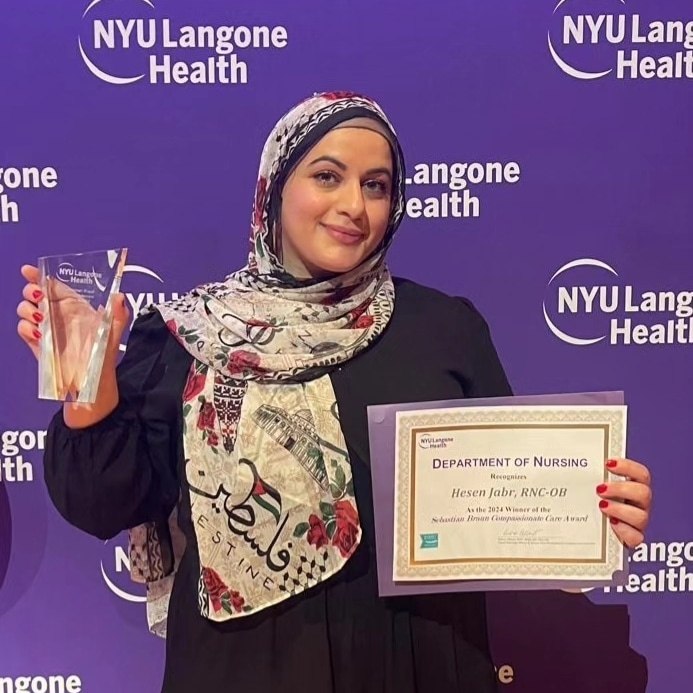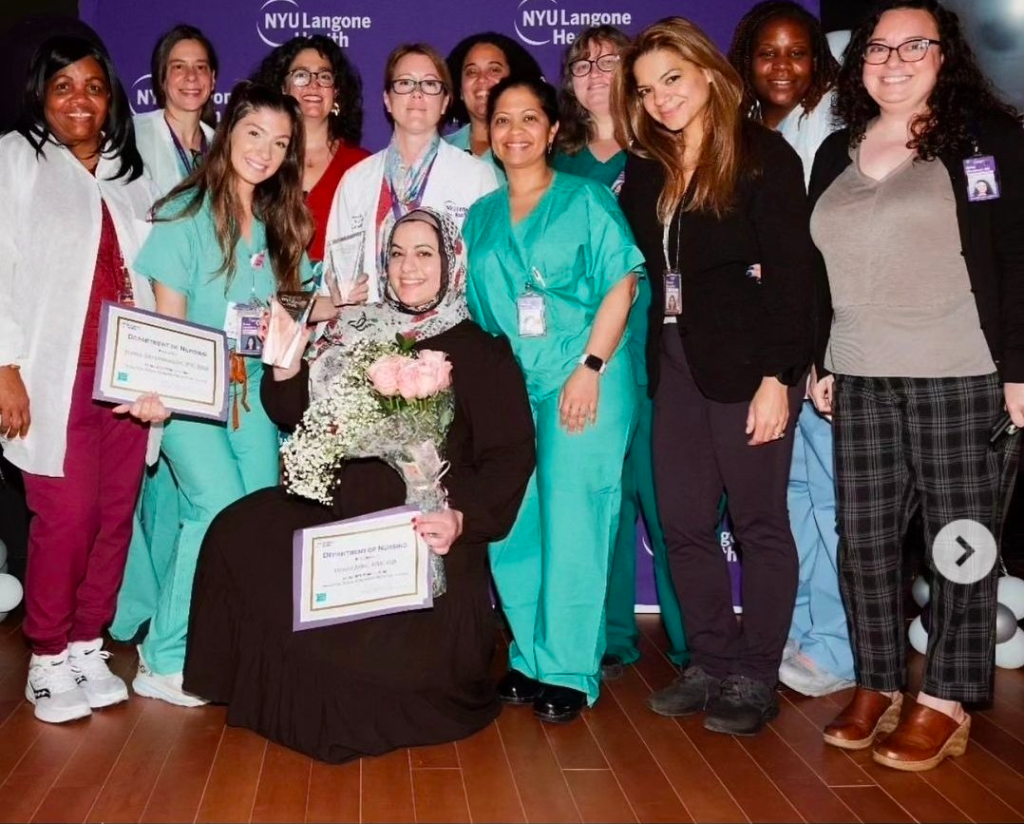Last month, labor and delivery nurse Hesen Jabr was given the Sebastian Brun Compassionate Care Award by her employer, NYU Langone Health. It is bestowed every year to “a nurse who exemplifies what it means to provide compassionate care to patients and their families” when they lose their baby during pregnancy or childbirth.
Jabr, who is Palestinian-American, included these three sentences in her acceptance speech:
It pains me to see the women from my country going through unimaginable losses themselves during the current genocide in Gaza. This award is deeply personal to me for those reasons. Even though I can’t hold their hands and comfort them as they grieve their unborn children and the children they have lost during this genocide, I hope to keep making them proud as I keep representing them here at NYU.
Shortly after, she was fired — and escorted off the premises by a plain clothes police officer at the end of her shift. Predictably, her case set off heated debates across all the social networks. Was the hospital right to terminate her?
There’s obviously nothing exceptional about tempers flaring about the events in Gaza. That happens every day — 24 hours a day. But nurses being fired over them? That felt new. And it raises professional questions that go well beyond any of our personal opinions about Israel.
What can a nurse say, and when? Is it ever appropriate to talk about world events in the workplace, no matter how heartrending they are or how personal the matter is to you? If not, are there any exceptions? When a nurse is provided the opportunity to give a speech, can they expect different standards to apply than in the break room?
Talking politics with patients is a pitfall most nurses will wisely avoid — though the patients might not always make it easy! Outside the hospital, on the other hand, there are plenty of precedents for nurses speaking out on causes they care about. At the height of the border crisis, for example, nurses organized on behalf of those stuck in unbearable conditions in detention camps. But is there any gray area in between?
Similar incidents have already torn apart the nation’s universities, from a dinner party hosted by the dean of UC Berkeley’s School of Law that ended up in an altercation to a valedictorian’s graduation speech at the University of Southern California that was preemptively cancelled. The video goes viral every time.
Could hospitals become the next flashpoint, and what’s the best way to contain tensions? Should management focus on ensuring nobody is made to feel unsafe, or err on the side of freedom of speech?
Jabr’s employer argues that they were merely being consistent, and that there was no ambiguity here. She recounted being “dragged” into a meeting with the hospital’s president and vice president of nursing after the event, and being told that she had “put others at risk” and “ruined the ceremony”. But an NYU Langone spokesperson said she had already been warned over a previous incident last December, and told “not to bring her views on this divisive and charged issue into the workplace” again. She did so anyway, so her contract was terminated.
We have regularly reminded all employees of our high standards, as well as our Code of Conduct and Social Media Policy, and all are held to those.
Steve Ritea, NYU Langone spokesperson
Earlier, NYU Langone suspended a medical resident for social media posts which defended the Hamas attacks of October 7, but also fired the director of the hospital’s cancer center because he had posted anti-Hamas cartoons on Twitter which included caricatures of Arab people. Many of Jabr’s defenders, however, argue that latter case is hardly equivalent:
People will get fired for posting racist content on their social media channels. They don’t normally get fired for expressing sympathy for innocent war victims.
Reddit comment by “DylanHate”
They can arguably point to the Code of Ethics for Nurses With Interpretive Statements of the American Nurses Association, which states that nurses “must bring attention to human rights violations” — like “genocide” — “in all settings and contexts”. Not immediately clear whether that applies to nurses five thousand miles away as much as those in situ, though; never mind the debate about whether we’re even talking about genocide in this case. Either way it’s not going to keep you from being fired!
So what do you think? What would you allow or disallow if you were in charge… and what do you do in practice?
Whatever you think of Jabr’s actual words, the one thing we’ll say (other than that you should probably read up on your employer’s policies) is that the bigger question of what nurses should be allowed to say has a surprising number of plausible answers.
Should nurses “stay in their lane” and avoid ever revealing their feelings or opinions? Or is it just with issues like this, specifically, where the stakes are simply too high? Would it be okay to use an occasion like a speech to raise awareness about topics you’d normally avoid, but only if they directly relate to healthcare policies? Would it have been okay for Jabr, as a Palestinian American nurse speaking about grieving mothers, to include a personal note about Gaza if she hadn’t called it a “genocide”?
Where can clear boundaries be drawn, what’s a gray area — and what risks are you ready to take?


